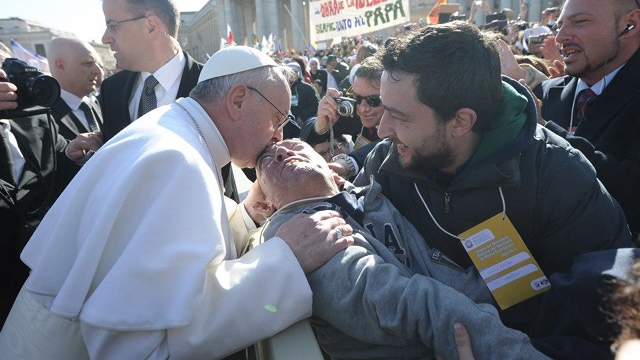SUMMARY
This is AI generated summarization, which may have errors. For context, always refer to the full article.

RIO DE JANEIRO, Brazil – Pope Francis is due in Brazil Monday, July 22, on his first foreign trip as pontiff to attend an international youth festival in the world’s biggest Catholic country.
The 76-year-old Argentine, Latin America’s first pope, will visit a nation still shaken by last month’s social unrest that saw hundreds of thousands rally in support of better public services and an end to endemic corruption.
The official purpose of the pontiff’s week-long trip is to meet with some of the 1.5 million young pilgrims attending World Youth Day. But he is also expected to see prison inmates and tour a hospital that treats drug addicts.
The leader of the world’s one billion Catholics, who has portrayed himself as a champion of the poor, will also seek to energize his flock in Latin America’s dominant power where rival evangelical protestant churches have made spectacular inroads over the past 3 decades.
A son of Italian immigrants, Francis knows the problems and injustices of the region well. He has called for a “poor Church for the poor” and railed against the “tyranny of money.”
Biggest police operation
Soon after his arrival, he will likely get a taste of Brazil’s restive mood, with local Anonymous “hacktivists” calling for a protest outside Rio state government headquarters where he is due to meet President Dilma Rousseff.
The organizers said their aim, among other things, was “to protest the $90 million in public spending for the papal visit” and denounce “excessive police violence” during June’s mass rallies.
In light of the expected demonstration, the pope will be flown by helicopter to his meeting with Rousseff.
Also planned during the papal visit are protests by gay rights activists and feminists.
In anticipation, authorities are rolling out a massive security operation.
The Defense Ministry, which is coordinating security, boosted the number of army, air force and navy personnel to be deployed from an initial 8,500 to more than 10,200.
And state security officials said they were mounting “the biggest police operation in (Rio de Janeiro’s) history.”
‘Popemobile’
Security will be especially tight at Rio’s Copacabana beach, where the pope will welcome young faithful.
A large police presence is also expected in Guaratiba, 40 kilometers (25 miles) west, where a papal mass and youth vigil will be held.
But possibly complicating security precautions, the former Buenos Aires archbishop has decided to ditch the bullet-proof “popemobile,” deciding instead to travel in an open-top jeep during his visit, which wraps up July 28.
Francis, the first non-European pope in 7 centuries, has rejected the pomp of the Vatican since his installation in March.
Continuing along these lines, he has turned down banquets with Brazilian officials, preferring to meet local priests and young people.
Some of the youths who spearheaded last month’s street protests expressed hope the pope will back their cause.
Pilgrimage
Like his predecessor Benedict XVI did during his 2007 visit to Brazil, the pontiff will travel by helicopter Wednesday, July 24, to the Shrine of Our Lady of Aparecida, a top pilgrimage site located halfway between Sao Paulo and Rio.
On Thursday, July 25, he will tour the Varginha favela in Rio, a hospital that treats crack cocaine addicts, and will meet prison inmates.
The pontiff has spoken out in favor of creating a youthful, more vibrant church, a message likely to resonate among the faithful in a country that is witnessing a surge in evangelical Protestants.
Some 123 million Brazilians identified themselves as Catholics in 2010 – 64.6% of the total population, compared with 91.8% in 1970, according to the latest census figures.
In contrast, evangelicals – capitalizing on deft use of their own television, radio and social media networks – continue to rise in numbers.
With an extensive network of places of worship, they grew from 5.2% of the population in 1970, to 22.2%, or 42.3 million, in 2010. – Rappler.com
Add a comment
How does this make you feel?
There are no comments yet. Add your comment to start the conversation.